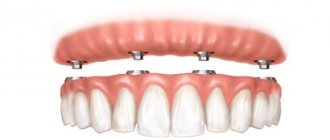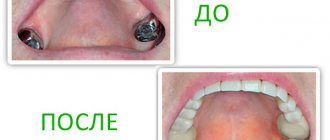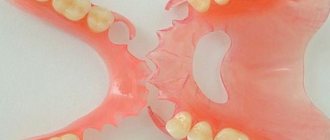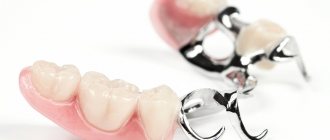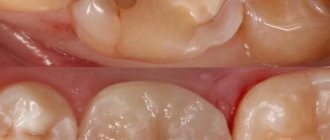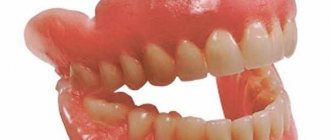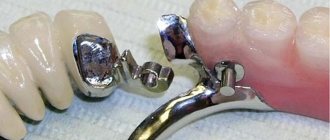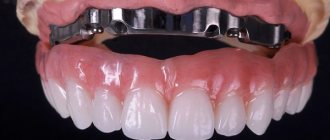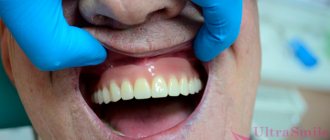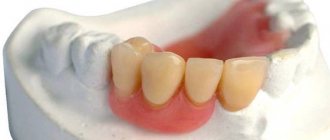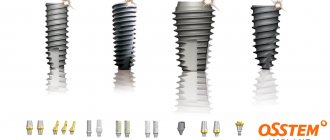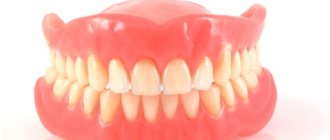Whoever invented it gets 1 dollar, whoever produced it gets 10, and whoever sold it gets 100.
American proverb.
A large-scale advertising campaign for this type of prosthetics completely disorients patients. Tempted by the brightly described advantages, aggravated by the impressive cost (“if it’s expensive, it means it’s really good”), the inexperienced consumer of dental services often chooses a similar design, without even realizing the underwater side of the iceberg. Let's try to highlight all the pros and cons of nylon prosthetics.
Material
For the manufacture of orthodontic structures, dental nylon is used, endowed with some useful properties.
For example, it is flexible and very similar in appearance to real fabrics. Sometimes flexible nylon dentures are called “invisible”, and this is true, because they literally merge with the mucous membrane and look very realistic. And from the outside it is not at all noticeable that a person’s teeth are not “his own”, but artificial. Dental nylon has such a property as softness.
This material is pleasant to the touch, despite the fact that it is a type of plastic. Ordinary plastic, from which orthodontic structures were previously made (and are still made) has a number of serious disadvantages. For example, products made from it rub the gums and are highly hard, which means that when wearing a plastic prosthesis, a person experiences not the most pleasant sensations and even discomfort. It is noteworthy that flexible nylon dentures are fixed to the supporting teeth using soft clasps.
Acrylic plastics
For decades, the primacy among structural materials has been held by polymeric (i.e., consisting of a large number of repeating units) derivatives of acrylic and methacrylic acids. They received their unique privileged position due to low toxicity, cost and ease of use: the transition from a fluid to a solid state does not require additional heating (cold polymerization polymers), which makes their use in clinical conditions possible.
Like any material, they are not without negative properties.
Among the disadvantages are:
- Surface microporosity (can cause plaque formation and discoloration);
- The presence of residual monomer - unreacted component - regardless of the manufacturing method;
- Volumetric and linear shrinkage - a decrease in size after curing due to the formation of bonds and ordering of the structure;
- Sufficient rigidity, which lengthens the period of adaptation (accustomation) to prostheses, and for some patients makes it impossible to use them without additional modification.
Interesting facts about dental nylon
Nylon is a thermoplastic that scientists have been studying for almost 70 years. As you know, nylon is a type of plastic that becomes highly elastic when exposed to a certain temperature. This property makes it possible to artificially recreate human organs and tissues, and research in this area is still ongoing. Over time, nylon was recognized as a safe material for the human body. And therefore it began to be actively used not only in dentistry, but also in medicine.
Americans were the first to “try on” nylon dentures. There is even a version that such orthodontic structures were created specifically for people in “extreme” professions (rescuers, police, military, firefighters, stuntmen). The professional activity of these people is associated with constant risk, and therefore dentures for them must be made of elastic materials, and nylon is most suitable for these purposes. Orthodontic products made from it are durable and not so easy to break. In Russia, prosthetics with nylon prostheses is just gaining momentum, and this know-how appeared back in 2001.
It is worth noting that both materials and technologies are constantly being improved, and now there is an incredible number of varieties of nylon used in different areas of human activity. For example, dental technicians and dentists around the world are well aware of nylon called AcryFree, which successfully combines the positive characteristics of nylon and acrylic. It is this material that is more suitable for the manufacture of complete removable dentures, since this symbiosis is ideal in all respects.
Advantages
- Orthodontic structures made of nylon break very rarely, which cannot be said about their acrylic counterparts, in which fracture of the bases is the main problem, occurring in 80% of cases.
- Hypoallergenic. Such products cannot cause an allergic reaction. And this is easy to prove with a simple example: after polymerization of acrylic, its composition contains up to 10% of the liquid (monomer) used to carry out this process. This substance is a strong allergen, and it can be released for five years from the date of installation of the structure. Nylon dentures do not contain monomer.
- Installation of the product does not imply grinding of the supporting teeth, that is, they are not required to be prepared.
- The absence of metal elements is a significant advantage, because they are too noticeable when talking and smiling. The nylon orthodontic structure is completely indistinguishable from real teeth.
- If the product is made correctly, it will not rub the gums and will not cause discomfort.
- Nylon has a uniform structure, which is explained by the peculiarities of its production, which means that a product made from it will fit as tightly as possible to the gum.
- Inability to color and absorb moisture are very important characteristics of the material.
- Such structures do not tend to loosen the supporting teeth, which is very important if they are affected by periodontitis. It is noteworthy that it is possible to get dentures in this way even if you have some dental diseases, and this method even allows you to strengthen your dentition, which greatly contributes to a speedy recovery.
- Reliable fixation without glue, gel and crowns, which is the merit of clasps.
- A nylon prosthesis, the price of which is affordable for almost everyone, is designed for 5-7 years of intensive use. But only if you follow all the care recommendations that a specialist from the A-Medic clinic will certainly give.
Opinions are divided!
Some patients are completely satisfied with orthodontic structures made of nylon, while others, on the contrary, tend to abandon them and give preference to acrylic analogues. Why is that? Because the Earth is full of rumors, and reviews read on the Internet and the opinions of friends who have had negative experiences wearing nylon prostheses can play a cruel joke on the patient. Where did this stereotype come from? The fact is that the first nylon structures were very soft and elastic, and at first foreign dentists used them only for temporary prosthetics, since the cost of nylon dentures was very affordable.
Their appearance in Russia greatly delighted less than honest dentists, who began recommending to their patients the installation of just such dentures, rather than acrylic ones. This “aggressive marketing” did not benefit ordinary people, since the structures lasted no more than three years, and doctors claimed that they were designed for a longer operational period.
In addition, the surface of the material, due to its softness, was poorly polished, and the orthodontic product itself was not the height of perfection and caused a lot of inconvenience when worn for a long time. All this became the reason for the emergence of stereotypes, which are helped to be broken by fundamentally new designs made from more modern and “adapted” varieties of nylon. By the way, a specialist at the A-Medic clinic can select the most suitable material for the patient.
Removable dental prosthetics systems on implants
The opinion of professionals is clear: implant prosthetics is the most modern and reliable solution, both for complete and partial edentia. The result of restoration using implants will not only be as durable as possible, but at the same time aesthetically pleasing and comfortable for the patient.
The procedure for installing removable dentures on implants is a long process and consists of several main stages:
- At the beginning of the restoration process, the oral cavity is prepared for subsequent manipulations. A thorough sanitation of the mouth is performed, and all dental diseases detected during the initial examination are treated.
- Next, the implant is implanted, after which a break is taken in the treatment, which is necessary for adaptation and healing of the damage.
- Crowns are installed and secured.
Removable dentures on implants can be made from different materials, the most budget-friendly of which are acrylic and ceramics. However, the cheaper the material, the more often the prosthesis will have to be changed, while products made from expensive industrial raw materials can last 10 years or more. Removable dentures on implants come in different types and differ both in the type of fasteners and in design - you can order both a single denture and a solid one.
Solid removable dentures on implants can be fixed in the patient’s mouth using different methods:
- Using ball-shaped fasteners. This fixation method is justified when only a few implants are required.
- Using beam fasteners. This installation method is optimal when securing a removable solid denture.
Another method of attaching a removable denture to implants is screw. The use of technology allows for high-quality restoration of the entire dentition, eliminating the need to install an implant on each unit - four implants will be enough to create reliable support for a removable denture. The advantages of the screw fastening method include the precision of fit of the structure on the implant, which ensures optimal distribution of pressure that occurs when chewing food.
Sometimes removable dentures on implants are called conditionally removable. This is explained by the fact that the fixation of the product in the oral cavity will be as strong as possible thanks to the locking system of the design. Such a prosthesis will not fall out when talking or eating and will look aesthetically pleasing and natural. However, the patient can, if necessary, remove the prosthesis at any time.
Prices for restoration with removable dentures on implants are quite high and they depend not only on the pricing policy of a particular dentistry. The full cost of the service will include the cost of preparing for implantation, manufacturing a removable denture, and the price of a specific design from a specific manufacturer. The choice of prosthetic technology will also affect the price of the procedure. But the costs in this case are fully compensated by the excellent and long-lasting results of restoration with removable dentures on implants.
There are a number of contraindications to prosthetics with removable dentures on implants, which you can find out about during a consultation with our dentistry specialists in Moscow - Vanstom. To make an appointment, just call us! We will offer you a full range of removable prosthetics services for complete or partial edentia and pleasant, affordable prices!
About the disadvantages
- Soft dentures are very easy to damage if you use regular pastes and brushes to clean them. In order for the care to be carried out correctly and not cause the product to fail and damage its appearance, you will need to take care of purchasing special liquids and brushes.
- If the material is too soft, this can lead to negative changes in bone tissue. That is, it simply atrophies, and unevenly. In addition, a loose fit of the clasps is the cause of excessive mobility of the structure, which can lead in mild cases to chafing of the mucous membrane, and in complex cases to periodontal disease.
- Dentures made of nylon, the prices of which vary, are not particularly amenable to repair and adjustment. In order to carry out the correction, the doctor requires a special “repair kit”.
- If the structure consists of nylon gums and plastic teeth, then the technician must correctly fix these two materials to each other. Otherwise, the teeth will simply come off, and at the most inopportune moment.
- Potential “carriers” of nylon dentures claim that orthodontic structures made of nylon tend to absorb odors, for example, tobacco or food.
- Pigmentation ability. One can argue with this, since much here depends on the quality of the material and its porosity. In general, staining a denture is not such a big problem, since it will still need to be professionally cleaned periodically.
- The appearance of scratches on the surface is a problem that arises due to the fault of a person who does not properly care for the product.
Dentures for restoration with complete edentia
Complete restoration of the dentition is necessary when all teeth have been lost and a complete removable denture is used for it, which allows you to effectively solve the problem of tooth loss, but keep in mind that such designs do not differ in reliability and long useful life, and especially the so-called soft orthodontic products - from plastic or nylon.
The rapid wear of the prosthesis is explained by the fact that with a complete restoration it is not possible to achieve coordinated work of the masticatory muscles: the main pressure will be exerted on the mucous and gingival part of the oral cavity and cause a decrease in the natural volume of the tissues of the jaw joint. As a result of this effect, the height of the gums will gradually decrease, and this process will ultimately lead to the fact that the old prosthesis simply will not stay on the installation bed. Moreover, the incorrect position of the removable denture in the mouth will provoke manifestations of pain when eating or actively talking.
Full removable orthodontic products are not the best option for restoring lost teeth because they cannot be properly fixed in the oral cavity and, especially, in the lower jaw area. Even the use of special adhesive gels will not give you a guarantee that the removable denture will not fall out of its place at the most inopportune moment. In such cases, dentists advise not to save money and initially carry out restoration with removable dentures on implants, which we will discuss in detail below.
USEFUL FACT: Removable dentures do not stop the process of bone tissue atrophy and, on the contrary, accelerate its progress. As the bone volume decreases, the denture will no longer stay in place and will require replacement. This is another reason why it is recommended to replace a removable orthopedic structure with a non-removable product as quickly as possible.
Varieties
If several teeth are missing from the dentition, a partial nylon denture can solve this problem. If only one tooth is missing, then the deficiency can well be compensated by a “single” prosthesis made of nylon, for the fixation of which you will not have to grind down the adjacent teeth, since the structure is fixed to them using clasps. “Butterfly” is a nylon prosthesis, which received such a poetic name due to the peculiarities of fixation to the supporting teeth, and is intended to replace one missing dental unit. Clasps really resemble butterfly wings.
In case of complete edentia, a complete removable nylon denture is used, and if previously it was not very popular due to the high softness of the material, now the popularity of such a product is only gaining momentum, and perhaps it will soon supplant its counterpart made of rough plastic. Although, some experts are not sure about this. It remains to add that the color of the material is selected individually.
Clasp removable dentures
Prosthetics with clasp dentures are in demand among patients because they allow one to obtain the most reliable and at the same time aesthetic result for the restoration of lost teeth. Structurally, removable dentures are a plastic base with a metal alloy arch on which artificial teeth are attached. The product is fixed to the prosthetic bed with special locks, the type of which is selected based on the characteristics of the case and the preferences of the person requesting the service.
Removable clasp dentures are applicable for both complete and partial restoration and are graded into different types according to the method of fixation:
- Removable dentures with clasps have special hooks made of a metal alloy, which are attached to the supporting teeth.
- Clasp products with attachment. The lock of the prosthesis is hidden inside it and consists of two elements, one of which is attached to the artificial crown, and the second - directly on the tooth of the structure.
- Prostheses with telescopic type crowns.
Clasp dentures can be made from different materials - metal, plastic and metal-ceramics. This makes it possible to choose the best option for different and most complex cases. Clasp-type structures have both pros and cons, which must be studied before making the final decision to install just such a prosthesis. The advantages include the affordability of clasp dentures, aesthetics, no need to remove the product before going to bed, and easy care.
Among the disadvantages of removable clasp dentures, the main one is worth highlighting - the process of adaptation to them is quite lengthy and during it the patient may be bothered by painful sensations. It is also worth considering that the design may be noticeable to prying eyes if prosthetics are performed in the smile area. But as you can see, clasp removable dentures have far fewer disadvantages than advantages, and at the same time, they stay firmly in the oral cavity, ensure proper distribution of the chewing load, and prosthetic constructions can be combined with treatment of teeth and gums.
Consequences of long-term wearing
Nylon prostheses tend to gradually deform during use. The fact is that the frame is not rigid, but flexible, and accordingly, it is not able to distribute the load evenly. It is noteworthy that the maximum pressure occurs on the most “active” part of the orthodontic structure. For this reason, a person may experience discomfort while eating, and bone tissue atrophies faster. But that’s not all: the chewing load falls not only on the middle part of the gum, but also on the marginal part. This can negatively affect periodontal tissue. If the patient is not afraid of the possible consequences of wearing such structures, then he can safely contact the specialists of the A-Medic clinic.
Review of the advantages and disadvantages of palateless dentures
The main advantage of removable dentures without a palate is the convenience and safety of the design for the patient. After the restoration procedure, the patient quickly gets used to the installed prosthesis, normal diction is maintained, and there is no unpleasant sensation of strong pressure on the soft tissues of the oral cavity. A removable denture without a palate will ensure optimal distribution of the chewing load and this will reduce the risk of rapid bone tissue atrophy.
There are also disadvantages to removable dentures without a palate. For example, high price. The service for prosthetics with an innovative system will cost more than the installation of plastic or nylon prostheses. It is also worth knowing that for prosthetics with removable dentures without a palate, the presence of supporting teeth is mandatory.
Indications for installation
- For children and adults, if the nylon prosthesis is removable, it should take on the function of a temporary orthodontic structure.
- Patients with periodontal disease are not prohibited from wearing these devices to restore the integrity of the dentition, but are recommended.
- Children who have lost their baby teeth early due to injury, advanced caries, etc.
- Patients with malocclusion and problems with the dental system.
- Persons engaged in a potentially dangerous type of professional activity, for whom it is extremely undesirable to wear plastic and metal prostheses.
- Nylon removable dentures are indispensable assistants during dental implantation, when a permanent dental crown cannot be immediately placed on the pin.
- People who have a “deficiency” of 1-5 dental units.
- Patients with diseases of the cardiovascular and endocrine systems.
- If you are allergic to other materials.
- If for some reason the patient cannot grind his abutment teeth.
Indications and contraindications
The main indication for the installation of Valplast is partial or complete absence of teeth associated with an allergy to plastic or metal alloys.
Although the patient may not necessarily be unable to tolerate other materials, sometimes the choice falls on Valplast due to the patient’s active lifestyle.
The installation of removable nylon dentures is not recommended for patients who have the effect of “low” teeth, significant atrophy of the alveolar ridge or increased mobility of the soft tissue of the gums.
Manufacturing and installation
A person who decides to install soft nylon dentures must first come to the A-Medic clinic so that the doctor determines the feasibility of installing them. If there are no obstacles to the implementation of the plan: there are no contraindications, and the gums and the oral cavity as a whole are in good condition, then prosthetics are possible. In the presence of inflammation and carious teeth, the process is postponed until these problems are eliminated. That is, the patient must undergo oral sanitation.
If everything is in order, the doctor makes impressions of the jaw, which are sent to the laboratory, where specialists will make a plaster model of it. Initially, the orthodontic structure is made of liquid wax, and it is this that is involved in the first fitting. The production of nylon prostheses begins only when the doctor is completely convinced that the wax copy “fits like a glove” and there are no complaints about it. This product is cast in a heat press, after which it is installed in its place. Any specialist involved in dental prosthetics must tell the patient about all the intricacies and difficulties of caring for an orthodontic structure.
Rules of care and wearing features
- Some people wear removable nylon dentures constantly, removing them only from time to time, which in itself is wrong, since the structure must be removed and washed with a stream of water after each meal. If this is not possible, then you need to at least rinse your mouth.
- Cleaning of the prosthesis is carried out twice a day, and special means and devices are used for these purposes. Of course, the patient should regularly brush his “real” teeth and rinse his mouth after every meal.
- If there is no special cleaning liquid, then regular toilet soap can be an alternative, but not toothpaste, and the brush should be very soft. At least twice a year, a nylon flexible prosthesis should be professionally cleaned, for which you just need to come to the A-Medic clinic.
- If for some reason the structure is not used for a long time, then in order to prevent drying out, it should be placed in a glass of water.
- After installing the product, you should not eat rough food for a while. And in order to quickly get used to the “foreign body” in your mouth, doctors recommend talking and reading aloud more.
- If discomfort occurs while wearing the structure, then you need to tell your dentist about all your feelings.
- It is not recommended to drop a soft dental prosthesis, and in order for it to last longer, it must be handled very carefully.
Advantages of thermoplastic dentures
Rice. 1. Valplast nylon prosthesis.
1. Aesthetics
Instead of the metal clasps of acrylic dentures, nylon ones have these elements made of white (tooth-colored) or red (gum-colored) plastic.
2. Durability
The impact strength of flexible prostheses is such that it is almost impossible to break them if accidentally dropped on the floor.
3. Adaptation
It is easier to get used to a nylon prosthesis.
Nylon or acrylic?
There is still ongoing debate among dentists and their patients about which material is better. Nylon dentures have been used in dentistry not so long ago, unlike acrylic ones, and often a person doubts and does not know what to prefer: time-tested acrylic or innovative nylon. For this reason, you need to know for sure in what situations a certain material will be more suitable:
- If this is a single prosthetic procedure, then it is recommended to close the “hole” in the dentition using an orthodontic product made of nylon. Dental prosthetics with nylon dentures is also recommended in cases where 2-3 dental units in a row are missing.
- If more than half of the teeth are missing in the oral cavity, then the choice of dental prosthetics method largely depends on the location of the “gaping voids”. It may be easier for a person to install implants than soft dentures. It is noteworthy that some dentists trust acrylic products more, since they are more widespread and familiar than their “innovative counterparts.”
- If orthodontic structures made of acrylic are installed in the oral cavity, then you can be sure that the load on them is distributed evenly.
- Nylon complete removable dentures are products to which their “wearer” gets used to very quickly. Acrylic analogues cannot boast of this.
- Both materials have advantages and disadvantages, and often the patient's choice is determined by price.
Dental dentures “Acry-free”
Innovative removable dentures are “Acry-free” dentures. These are elastic and flexible products made from unique raw materials based on acrylic resin. Acrylic gives the finished structure the necessary strength, rigidity and ensures its durability during operation.
Acri-Free removable dentures are often confused with products made of nylon or plastic, but this is a mistake: the designs have individual quality characteristics and are also easy to restore if the system breaks down. The material for making removable dentures Acry-free is biocompatible with the tissues of the oral cavity and is identical in color to the shade of the gums, which makes the finished structure aesthetic and invisible to others.
Choosing Acri-Free removable dentures is advisable if you have the following indications:
- An individual allergic reaction in a patient to metal alloys and plastic.
- The loss of both one tooth and the complete loss of dental units in rows.
- Periodontitis and periodontal disease. Installing a removable denture for this pathology will help prevent the process of further loosening of the teeth.
- Acri-Free soft prostheses are recommended for people whose professional activities are associated with an increased risk of injury.
Removable dentures of this type are valued by professionals for a significant number of advantages. In particular, the system may be used in prosthetics in cases where the patient has serious gum disease. Acri-Free structures are firmly fixed in the mouth, easy to repair, and the material they are made of does not cause allergic reactions or irritation of sensitive tissues of the oral cavity.
The advantage of Acri-Free is its excellent indicator of the tight fit of the products to the prosthetic bed, which eliminates the manifestation of pain when eating and helps to ensure proper functioning of the masticatory muscles. To install the system, it is not necessary to pre-file healthy teeth, and the prosthesis itself does not sag, does not absorb moisture, and pathogenic bacteria and foreign substances that can stain or damage the product do not penetrate into it. The structures do not require specific and labor-intensive care, their cost is lower than that of nylon removable dentures and, if desired, you can leave the denture on at night.
The only disadvantage of Akri-Free removable dentures is that their constant use will lead to gradual atrophy of bone tissue. But this disadvantage is characteristic of all types of systems used in removable prosthetics.
How much does a nylon prosthesis cost?
Each clinic providing dental services and dental prosthetics has its own pricing policy. Nylon flexible prostheses, the price of which may please some and upset others, are becoming more popular day by day. But before installing them, it is recommended that you familiarize yourself with the prices, because each dental clinic has their own. The final cost of dentures depends on various factors.
For example, on the condition of the oral cavity, on the number of missing teeth, on the location of the clinic and its reputation. The skill of a specialist plays an important role in pricing, and the higher the professional rating, the more expensive the doctor’s services. In any case, the installation of such orthodontic structures will cost much less than implantation and prosthetics with zirconium crowns.
Nylon dentures, the cost of which is affordable, for many people are the only opportunity to fill gaps in the dentition, and without significant financial expenses.
It is worth noting the fact that structures are not always fixed using soft clasps, since they can be metal. This is a cost-reducing factor, but the fact is that metal clasps are too noticeable and there can be no talk of any aesthetics. Therefore, before giving them preference, you should think carefully: is such saving necessary that it worsens aesthetic characteristics? There is an opinion that “hard fixation” is more reliable, but in fact, this assumption is not true, since soft clasps also perform their task well.
